Hiper-Realite Bağlamında ‘Yumuşak ve Sert Gücün’ ‘Akıllı Güce’ Dönüşebilmesi Üzerine” Sosyolojik Tetkikler: Kuzey Suriye Örneği
Author :
Abstract
Âlimin yerini entelektüel, dini bilginin yerini bilimsel bilgi ve dini hakikatin yerini pozitivist gerçekliğin aldığı günümüzde, Müslümanların, Batı metodolojisinin dışında Batıyı dışlamayan ama kavramsal açıdan oryantalist bir yaklaşımı da reddeden bir söylem geliştirmesi gerekmektedir. Müslümanlar tarih anlayışında yaşadıkları metodolojik sorun yüzünden bu söylemin tarihsel arka planını da yeniden inşa etmek zorundadır. Modernliğin tarih algısına yakın bir söylem biçiminin Müslüman toplumlar arasında kabul edilmiş olması, tarihte muhakkak bir ilerlemenin olacağını da beraberinde getirdiği için, Müslüman düşünürler de zaman ve mekân açısından bir ilerleme tasavvurunun peşinden gitmektedirler. İlkellikten mükemmelliğe doğru olan gidiş biçimi ise batıya aittir ve Müslümanlığın özünde böyle bir gidişin olduğunu söylemek pek de mümkün görünmemektedir. Modern anlamda evrimci bir ilerlemenin karşısında duran bu söylem biçimi İlahi olmasının yanında rasyonel bir karşılık da bulmaktadır lakin İslam’ın yanlış yorumlanması ve bu yorumlardan çıkan sonuçlar, bizi birçok kere olumsuz toplumsal kurguların yanına yerleştirmiştir. Hem ülkemizde hem de dünya genelinde Müslümanlık ile karşılıklı konumlandırılan şiddet olgularının arkasında işte bu yanlış rehabilite ve sosyo-politik gerçeklik yatmaktadır. Müslümanların bu bağlamda gittikçe batının da etkisiyle kendilerine yabancılaştıkları gözümüzden kaçmamaktadır. İslam’ın farklı yorumları da bu yabancılaşma üzerinden inşa edilmektedir. Çünkü ilerlemeyi İslam’ın karşısına bir evrimleşme süreci olarak çıkarırsak veya batının ilerlemeyi böyle anlatmasına izin verirsek, o zaman bireylerin kendilerine daha fazla yabancılaşmasının da önüne geçmek oldukça zor olacaktır. Bu yabancılaşma sonucunda ise öze dönüldüğü sanılan kronik günahkârlık duygusu hissedilecek ve buna verilecek cevaplar aranmaya başlanacaktır. İşte PYD diye isimlendirdiğimiz ve kendisine ortak davranış biçimleri veren sistem olarak açıkladığımız bu yapının, yukarıda ifade edilenler bağlamında ortaya çıkış süreci de bu kronik günahkârlık bağlamından kopuk değildir. Parçalanmış bir iman sendromu yaşayan bu örgüt, batı nezdinde neredeyse İslam karşıtı olma ve bütünleşme ihtiyacını düşük kendilik saygısıyla ortaya koymaktadır. PYD’nin bu tavrı sahip olduğu kimliksel çatlakların kronik günahkârlıkla doldurulmasıyla yakından ilişkilidir. Parçalanan iman sendromu, PYD’yi şu an yaptığı türden irasyonel eylemlerin hastalıklı olduğunu ve bir hastaya göre de meşru olduğunu ifade etmektedir. İşte biz bu çalışmada, Erich Fromm’un parçalanmış iman sendromundan yola çıkarak, PYD’nin iliklerine sinen bu kronik günahkârlığı sosyal psikolojik bir söylem biçimiyle izah etmeye çalışacağız. PYD’yi ortaya çıkaran sosyo-psikolojik etkenleri tartışarak, kendisini ortaya çıkaran bu öğeleri PYD’nin nasıl kabul ettiğini, yanlış rehabilite olarak bunları nasıl kullandığını ve bu kurguya karşılık oluşturulacak global güvenlik diplomasisini sosyo-politik bir dil ve de sivil bir oluşum ile analiz etmeye çabası içinde olacağız.
Keywords
Abstract
In today's world, where the scholar is replaced by intellectual, religious knowledge by scientific knowledge and religious truth by positivist reality, Muslims need to develop a discourse apart from Western methodology that does not exclude the West but rejects an orientalist approach conceptually. Muslims have to reconstruct the historical background of this discourse because of the methodological problem they experience in their understanding of history. Since the acceptance of a form of discourse close to the modernity’s perception of history among Muslim societies brings about a certain progress in history, Muslim thinkers are also pursuing an imagination of progress in time and space. This way of going from primitive to perfection belongs to the West, and it does not seem possible to say that there is such a trend at the core of Islam. This form of discourse, which opposes evolutionary progress in the modern sense, is not only divine but also rationally responds, yet the misinterpretation of Islam and the conclusions of these have placed us with negative social fictions many times. It is this false rehabilitatied and socio-political reality that lies behind the violence cases that are positioned as equivalent to Islam both in our country and around the world. In this context, that Muslims are getting increasingly alienated from themselves also by the western influence is not overlooked. Different interpretations of Islam are also built on this alienation. Because if we take progress as a process of evolution against Islam, or if we allow the West to explain progress this way, then it will be too difficult to prevent individuals from getting more alienated from themselves. As a result of this alienation, a sense of chronic sinfulness mistaken for returning to the essence will be felt and answers to this will be sought. The process of the emergence of this structure, which we call PYD and explain as a system giving itself common forms of behavior, is not disconnected from this chronic sinfulness context. This organization, which has Split Faith Syndrome, reveals its need for being almost anti-Islam/against Islam in the eye of the West and for integration, with low self-esteem. This attitude of the PYD is closely related to the filling of its identity cracks with chronic sinfulness. The Split Faith Syndrome implies that the irrational actions of the type that the PYD is doing now are diseased and legitimate for a patient. In this study, we will try to explain this chronic sinfulness which has jarred every bone in the body of the PYD in the form of a social psychological discourse based on Erich Fromm's Split Faith Syndrome. By discussing the socio-psychological factors that revealed PYD, we will be in an effort to analyze how it accepted these elements revealing it, how it has been using them as being false rehabilitated and the global security diplomacy to be created in response to this fiction with a socio-political language and a civil formation.
